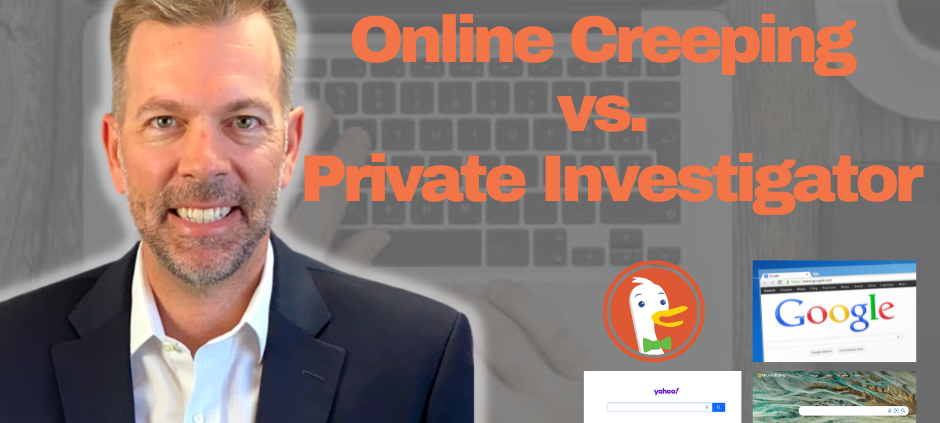Online Creeping or Private Investigator?
Is it fun for you guys, referring to PRIVATE INVESTIGATORS, to spend hours to creep on somebody just to find out things anyone could find on google? Do you feel proud?
This is a real comment posted as a question in response to one of our prior videos.
Let’s start with some statistics…
Google has placed in its index an estimated 35 trillion Web pages across the Internet worldwide. While this is an amazing statistic, believe it or not, 35 trillion is barely the tip of the iceberg.
Google’s index represents only an estimated 4 percent of the information that exists on the Internet. This is not a typo or misprint. The actual information that exists on the Web is impossible to know, but is estimated to be 500 times what is currently available through Google. Hard to believe, but true.
So based on this data if you only conducted a GOOGLE search on your subject this could cause you to miss 96% of the information that is out there on the WEB. Advanced searching on Google using BOOLEAN search techniques is good starting point, but you should also check Bing, Yahoo, Duck Duck Go and other search engines as Google will often show you information based on your location, profile and search history not necessarily the best results for an investigation.
Let’s start by defining the term CREEP on somebody. In my opinion there is physical creeping which I would call surveillance. There is also online creeping which would involve developing the online footprint of your subject involving everything from posts and comments on social media to public records like court cases.
In almost all cases the information and evidence obtained through conducting hours and hours of physical surveillance is not something that can be developed through a simple google search. Surveillance efforts typically uncover activity patterns, the physical condition or apparent injuries of your subject, interactions with people and where someone might be working.
Online creeping or should I SAY open-source intelligence gathering can develop a great deal of information on a subject. You might be able to develop alias names, address history, news stories, social media profiles, business ownership and court records involving your subject that might point you in the direction of a criminal case as an example.
A google search will be effective assuming a couple of things.
First that your subject is active on social media. Second, that your subject lives or works in states and counties that serve up court records publicly which allows for search engines to grab and reported them. Florida is a good example of state with fairly open access to public records.
In many states and counties throughout the US public records are not available via a google search. Instead, a website that requires a username and password along with search credits is required to conduct searches on your subject. These types of websites are referred to as the DEEP WEB.
There are a ton of people search and data aggregation sites out there that claim to develop a ton of VERIFIED information. My experience is that the BASIC search features of these sites are free, but if you want the details, you must pay a fee. And even then, these types of sites are not comprehensive in nature and will not pull details from court records nor will they be able to pull back court records from password protected pay sites like the Los Angeles Superior Court as example.
Another major problem in relying on a GOOGLE search is that as a licensed private investigator you should NOT draft a repot based on records and information you found on google. You must go a step further and verify your findings by pulling or getting copies of source documents like criminal records, deeds of trust, court records and DMV records.
If I am called to testify in deposition or at trial and I am asked how I came to learn of some piece of information or evidence during my investigation, I can’t say GOOGLE. I must cite source records and show my process to confirm that the information found is accurate and relevant.
Online creeping sound fun and easy, but it won’t get you admissible evidence you can present to a court or a client. It takes a little bit more.
